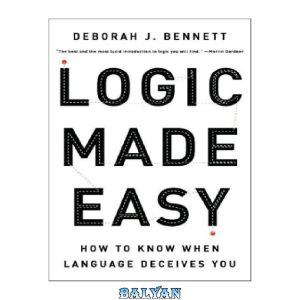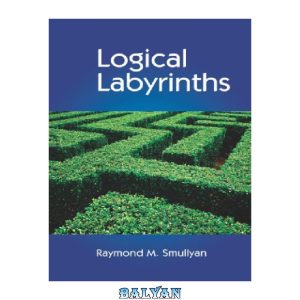ترجمه فارسی توضیحات (ترجمه ماشینی)
منطق شرطی و ترجیحی: روش های اثبات و اثبات قضیه
این جلد شامل نسخه اصلاح شده و به روز شده نویسندگان Ph.D. پایان نامه و بر روش های اثبات و اثبات قضیه برای منطق های شرطی و ترجیحی متمرکز است. منطق های شرطی بسط های منطق کلاسیک با استفاده از عملگر شرطی هستند که معمولاً به صورت => نشان داده می شود. منطق های شرطی تاریخچه ای طولانی دارند و اخیراً در چندین حوزه هوش مصنوعی از جمله بازنگری و به روز رسانی باورها، نمایش استنتاج های علّی در برنامه ریزی اقدام و رسمی سازی پرس و جوهای فرضی در پایگاه های داده قیاسی کاربرد پیدا کرده اند. منطق های شرطی نیز به منظور رسمی کردن استدلال غیر یکنواخت به کار گرفته شده است. مطالعه روابط بین منطق شرطی و استدلال غیر یکنواخت منجر به کار اساسی کراوس، لمان و ماگیدور شده است که به اصطلاح چارچوب KLM را معرفی کرده اند. بر اساس این چارچوب، یک پایگاه دانش غیرقابل ابطال با مجموعه محدودی از ادعاهای شرطی به شکل A |~ B نشان داده میشود، که خواندن شهودی آنها «معمولاً (معمولاً)، Aها B هستند» است. عملگر |~ غیر یکنواخت است به این معنا که A |~ B به معنای A و C |~ B نیست. منطق چارچوب KLM، که به عنوان منطق ترجیحی نیز شناخته می شود، امکان استنتاج ادعاهای شرطی جدید را از یک پایگاه دانش داده شده فراهم می کند. علیرغم اهمیت آنها، مکانیسم های قیاسی بسیار کمی برای منطق های شرطی و ترجیحی ایجاد شده است. نویسنده در این کتاب با معرفی روشهای اثباتی (حسابهای متوالی و جدولی) برای منطقهای شرطی و ترجیحی و نیز اثباتکنندههای قضیهای که با اجرای محاسبات پیشنهادی بهدست میآیند، تلاش میکند (تا حدی) خلأ موجود را پر کند.
IOS Press یک ناشر علمی، فنی و پزشکی بینالمللی کتابهای با کیفیت بالا برای دانشگاهیان، دانشمندان و متخصصان در همه زمینهها است.
برخی از حوزههایی که ما در این زمینه منتشر میکنیم:
-زیست پزشکی – سرطانشناسی – هوش مصنوعی – پایگاههای داده و سیستمهای اطلاعاتی – مهندسی دریایی – فناوری نانو – مهندسی زمین – همه جنبههای فیزیک – حکومت الکترونیک – تجارت الکترونیک – اقتصاد دانش -مطالعات شهری -کنترل تسلیحات -درک و پاسخ به تروریسم -انفورماتیک پزشکی -علوم کامپیوتر
This volume contains a revised and updated version of the authors Ph.D. dissertation and is focused on proof methods and theorem proving for conditional and preferential logics. Conditional logics are extensions of classical logic by means of a conditional operator, usually denoted as =>. Conditional logics have a long history and recently they have found application in several areas of AI, including belief revision and update, the representation of causal inferences in action planning and the formalization of hypothetical queries in deductive databases. Conditional logics have also been applied in order to formalize nonmonotonic reasoning. The study of the relations between conditional logics and nonmonotonic reasoning has led to the seminal work by Kraus, Lehmann and Magidor, who have introduced the so-called KLM framework. According to this framework, a defeasible knowledge base is represented by a finite set of conditional assertions of the form A |~ B, whose intuitive reading is “”typically (normally), the A’s are B’s””. The operator |~ is nonmonotonic in the sense that A |~ B does not imply A and C |~ B. The logics of the KLM framework, also known as preferential logics, allow to infer new conditional assertion from a given knowledge base. In spite of their significance, very few deductive mechanisms have been developed for conditional and preferential logics. In this book, the author tries to (partially) fill the existing gap by introducing proof methods (sequent and tableau calculi) for conditional and preferential logics, as well as theorem provers obtained by implementing the proposed calculi.
IOS Press is an international science, technical and medical publisher of high-quality books for academics, scientists, and professionals in all fields.
Some of the areas we publish in:
-Biomedicine -Oncology -Artificial intelligence -Databases and information systems -Maritime engineering -Nanotechnology -Geoengineering -All aspects of physics -E-governance -E-commerce -The knowledge economy -Urban studies -Arms control -Understanding and responding to terrorism -Medical informatics -Computer Sciences












نقد و بررسیها
هنوز بررسیای ثبت نشده است.